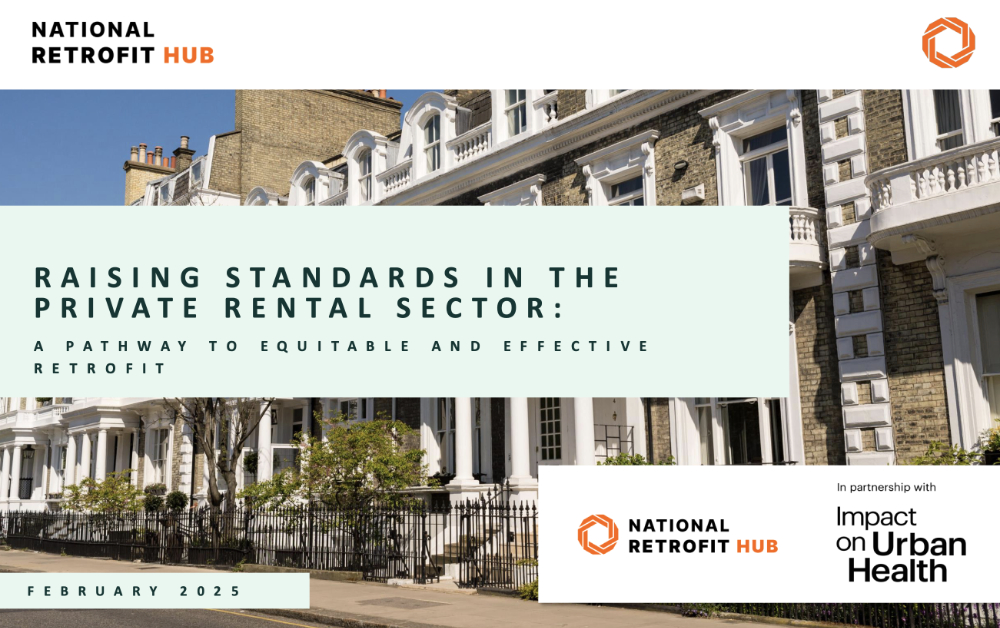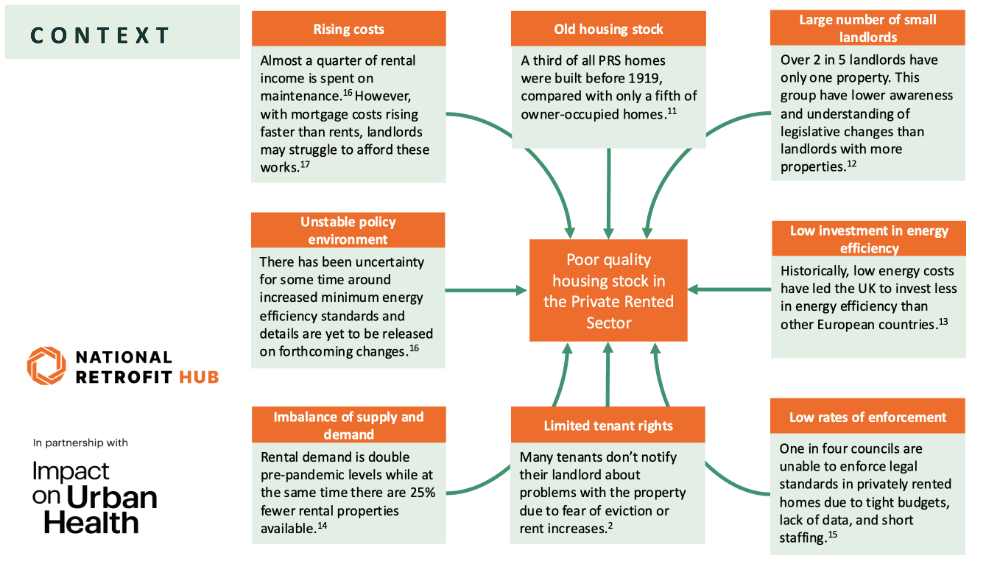Private rental sector report calls for urgent action to address poor living standards and fuel poverty
Contents |
[edit] New private rental sector report
A report from the National Retrofit Hub published in February 2025, developed in partnership with Impact on Urban Health, exposes the urgent need to improve energy efficiency in the private rental sector (PRS).
With 4.5 million households renting privately in England [Shelter] and a shocking 1 in 4 renters living in fuel poverty (Generation Rent), the report underscores the stark realities of a housing market failing its tenants and the environment.
The report delivers a clear message: without immediate action, the PRS risks falling further behind other housing sectors, leaving millions of renters in cold, inefficient homes. This report explores these challenges and proposes a supported pathway to improved housing that considers the needs of both landlords and tenants.
[edit] Addressing poor living standards and fuel poverty
Millions of renters in the private rental sector are living in substandard conditions, with poorly insulated homes leaving tenants exposed to the harsh realities of fuel poverty and inequality. Currently, 1 in 4 renters in England struggle to afford their energy bills (National Energ Action), a crisis exacerbated by rising costs and the inefficiency of older properties. Many tenants face daily challenges to keep their homes warm and healthy, while landlords often lack the necessary support to make significant improvements.
“This situation highlights a systemic issue” commented Cara Holmes, National Retrofit Hub Technical Programme Manager. “The private rental sector risks falling behind other housing tenures, leaving renters trapped in a cycle of inadequate housing and energy insecurity. Tackling this problem requires a coordinated effort to raise standards, improve living conditions, and ensure fair outcomes for both tenants and landlords.”
[edit] Supporting landlords to drive energy efficiency improvements
The report highlights the practical challenges landlords face in balancing their financial goals with the need to improve their properties’ energy efficiency. Many landlords view their properties as long-term investments. As one landlord explained, “I got the property because it was the best investment compared to putting my money into a savings account.”
While many are committed to maintaining their properties and complying with regulations, the report reveals that landlords often see regulations as a target to meet rather than an opportunity to exceed. “If I’ve had an EPC assessment on my property and it’s below the requirements, I’d want absolute clarity on what my options are to bridge the gap between where I am and where I need to be,” said another landlord.
Financial barriers remain a significant hurdle for many. “I don’t have a mortgage, so extending it isn’t an option. The issue would be interest rates and over how many years,” one landlord noted.
The findings underline the importance of providing landlords with practical, accessible solutions to retrofit their properties effectively, ensuring they can balance their investment goals with the urgent need for energy efficiency improvements.
[edit] A bold call for action
The report calls for immediate updates to Minimum Energy Efficiency Standards (MEES), setting ambitious yet achievable targets to:
- Drive significant, high-quality retrofit activity.
- Prevent the private rental sector from falling further behind other housing tenures.
- Minimise exemptions, ensuring as many properties as possible benefit from improvements.
However, raising standards alone is not enough. Landlords need a robust package of support to enable meaningful change, including:
- Tax incentives to ease the financial burden of upgrades.
- Full-service solutions, such as on-bill schemes, that integrate financing with retrofit works.
- A central role for agents in coordinating retrofit activity, reducing costs, and aggregating demand.
- To ensure tenants are not left behind, the report also calls for stronger compliance and enforcement measures, including:
- Greater awareness among tenants and landlords about rights, responsibilities, and available advice.
- Robust tenant protections during retrofit works.
- Increased funding for local authorities to enforce regulations effectively.
[edit] Join the conversation and take action
The National Retrofit Hub and Impact for Urban Health invite policymakers, landlords, and industry professionals view the report and take part in conversations about the future of energy efficiency in the private rental sector.
This article appears on the NRH website as 'New report into the private rental sector calls for urgent action to address poor living standards and fuel poverty' and was written by Ben White, dated 13 February, 2025.
[edit] Related articles on Designing Buildings
- Adapting 1965-1980 semi-detached dwellings in the UK to reduce summer overheating and the effect of the 2010 Building Regulations.
- Decent homes standard.
- Energy companies obligation ECO.
- Fuel poverty.
- Heat Energy: The Nation’s Forgotten Crisis.
- Household in poverty.
- Housing contribution to regeneration.
- Measuring Fuel Poverty.
- Poverty.
- The cold man of europe 2015.
- The full cost of poor housing.
- The real cost of poor housing.
- The Warm Arm of the Law.
Featured articles and news
Latest Build UK Building Safety Regime explainer published
Key elements in one short, now updated document.
UKGBC launch the UK Climate Resilience Roadmap
First guidance of its kind on direct climate impacts for the built environment and how it can adapt.
CLC Health, Safety and Wellbeing Strategy 2025
Launched by the Minister for Industry to look at fatalities on site, improving mental health and other issues.
One of the most impressive Victorian architects. Book review.
Common Assessment Standard now with building safety
New CAS update now includes mandatory building safety questions.
RTPI leader to become new CIOB Chief Executive Officer
Dr Victoria Hills MRTPI, FICE to take over after Caroline Gumble’s departure.
Social and affordable housing, a long term plan for delivery
The “Delivering a Decade of Renewal for Social and Affordable Housing” strategy sets out future path.
A change to adoptive architecture
Effects of global weather warming on architectural detailing, material choice and human interaction.
The proposed publicly owned and backed subsidiary of Homes England, to facilitate new homes.
How big is the problem and what can we do to mitigate the effects?
Overheating guidance and tools for building designers
A number of cool guides to help with the heat.
The UK's Modern Industrial Strategy: A 10 year plan
Previous consultation criticism, current key elements and general support with some persisting reservations.
Building Safety Regulator reforms
New roles, new staff and a new fast track service pave the way for a single construction regulator.
Architectural Technologist CPDs and Communications
CIAT CPD… and how you can do it!
Cooling centres and cool spaces
Managing extreme heat in cities by directing the public to places for heat stress relief and water sources.
Winter gardens: A brief history and warm variations
Extending the season with glass in different forms and terms.
Restoring Great Yarmouth's Winter Gardens
Transforming one of the least sustainable constructions imaginable.

























